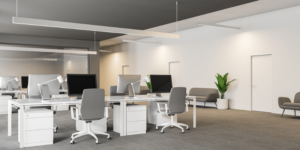The COVID-19 pandemic has changed the way businesses use office spaces.
Traditional offices are now giving way to the next-gen concept of coworking or flexible workspaces. But the question that remains is, does it hold any water to conventional offices? The answer is a big yes!
Unlike traditional workspaces, coworking offices are typically furnished and equipped with all the amenities that a typical office provides, allowing businesses to get up and running as soon as they arrive.
These benefits are included in their rental agreements, so companies don’t have to worry about hidden costs or high CAPEX. Many employers and employees worldwide have welcomed flexible working arrangements as the new normal post this pandemic for reasons such as these. Here is how the pandemic has affected the workspaces-
1. Be prepared for changes
Undoubtedly, few firms had prepared for a worldwide health emergency in 2020. Operations on all fronts were disrupted, leading to chaos and losses to the businesses.
However, the pandemic taught companies an essential lesson, that is, preparation is key to dynamism. Every company must be prepared for a scalable and effective emergency plan that might help prevent business interruptions and staff misunderstanding during any crisis.
Coworking workspaces provide the power of dynamism to the business and thus help them prepare for uncertainity..
2. Personal space is a must (even literally)
The COVID-19 pandemic brought to light the need for social distancing norms that even offices must adhere to. While traditional offices do not provide this flexibility of structure or the option to de-congest the workspaces, coworking workspaces proved to be just the suitable models for benefits such as these.
With coworking spaces, businesses could opt for offices that gave them geographical advantages and set them up while following the post-pandemic protocols.
3. Coworking is the workplace of tomorrow
Business models have been evolving for a long time. From traditional offline models to new tech-based online models, businesses have been, by and large, driven by technological advancements worldwide.
With more recent requirements and standards in office requirements, companies today prefer flexibility when it comes to CAPEX, location, rental agreements, and office furniture.
Coworking spaces broadly address this and provide a complete solution to the businesses. Post pandemic, as the requirements have changed, coworking workspaces are becoming the future of workspaces that are just the right choice for companies seeking a competitive edge.
4. The community has the power to bring a change
Coworking brings together a community of creative minds and industry experts to extend their community-building across the workspace.
Not only do the businesses benefit from this, but they also get to be with a community that has the power to bring a change.
The coming together or pooling of resources has created a positive and conducive business environment that is a win-win for all.
The examples above show us that we can start planning for the future now if we start using better alternatives such as coworking spaces. Corporate lifestyles have been matched with the needs of the hour thanks to adaptive workplaces and flexible office layouts.
Flexible workplaces are exactly what’s needed to support this shift in the workspace industry. With their growing popularity, there is no doubt they will be a viable option for meeting the post-pandemic workplace requirements.
(Disclaimer: The views and opinions expressed in this article are those of the author and do not necessarily reflect the views of YourStory.)










